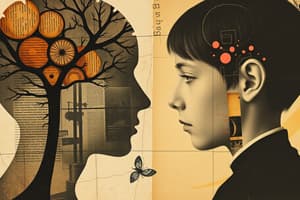Podcast
Questions and Answers
According to Erikson's theory, identity formation involves how many main conflicts or stages?
According to Erikson's theory, identity formation involves how many main conflicts or stages?
- 4
- 6
- 10
- 8 (correct)
According to Erikson, if a child has a responsive caregiver who meets their physical and emotional needs, they will develop a sense of:
According to Erikson, if a child has a responsive caregiver who meets their physical and emotional needs, they will develop a sense of:
- Inferiority
- Competence (correct)
- Distrust
- Mistrust
According to Erikson, the development of certain socially based competencies, such as trust and initiative, are involved in each stage of:
According to Erikson, the development of certain socially based competencies, such as trust and initiative, are involved in each stage of:
- Piaget's theory
- Kohlberg's theory
- Vygotsky's theory
- Erikson's theory (correct)
Which developmental theorist proposed a series of life stages or conflicts that we all deal with?
Which developmental theorist proposed a series of life stages or conflicts that we all deal with?
According to Erikson, the outcome of each conflict or stage depends on:
According to Erikson, the outcome of each conflict or stage depends on:
Flashcards are hidden until you start studying
Study Notes
Erikson's Theory of Identity Formation
- Involves 8 main conflicts or stages
- Developmental stages are a series of life stages or conflicts that everyone deals with
Trust and Initiative
- Development of certain socially based competencies, such as trust and initiative, are involved in each stage of identity formation
Caregiver's Role
- A responsive caregiver who meets a child's physical and emotional needs helps develop a sense of trust
Outcome of Each Conflict
- The outcome of each conflict or stage depends on the resolution of the crisis in that stage
Studying That Suits You
Use AI to generate personalized quizzes and flashcards to suit your learning preferences.




